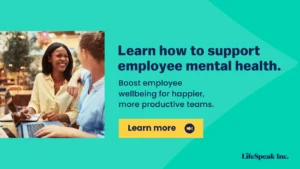What is Lifestyle Medicine? 6 Ways to Use Your Habits for Better Health
What is Lifestyle Medicine? 6 Ways to Use Your Habits for Better Health
We hear a lot about the impact of lifestyle on health, but did you know it has a name? It’s called lifestyle medicine, and it focuses on preventing chronic diseases by addressing their root causes with simple, sustainable changes.
So, what is lifestyle medicine? LifeSpeak expert Dr. Reena Kotecha, a physician and organizational consultant, shares her insights into the six key areas of lifestyle medicine, offering practical strategies to enhance your health and vitality.
If I mentioned the word medicine to you, what image comes to mind? For most of us, it’s likely a pill, injection, or some other form of a prescribed drug. But what if I told you that the best medicine for wholesome and optimal health is in fact your lifestyle?
What is lifestyle medicine?
Lifestyle medicine is gaining specialty status because, according to the American Board of Lifestyle Medicine, chronic disease is now responsible for 70–80% of all healthcare expenditure and lifestyle medicine serves to address the underlying cause of these diseases.
My aim here is to explore the six key areas of lifestyle medicine and offer you tools to optimize your health and wellbeing through daily doses of lifestyle behaviors.
6 key areas of lifestyle medicine
1. Healthy eating
Takeout food, ready-made meals, and sugary snacks are highly processed and have become the mainstay of the modern-day diet. While this pattern of eating may be easy and save time in today’s fast-paced world, it’s damaging our mental and physical health. Processed foods weaken the integrity of our gut wall, making it more permeable. Harmful substances from inside the gut slip through into the bloodstream causing inflammation within the body. And inflammation is a marker of common chronic diseases such as diabetes, arthritis, heart disease, depression, and even Alzheimer’s disease.
The good news is that small tweaks in your diet can have major positive health benefits. Here are some ways to get started:
- Unprocess your diet. ‘Real foods’ such as fruits, vegetables, nuts, beans, eggs, meat, and fish don’t need a label and are easily identifiable in their natural state. The NOVA food-rating system separates foods into four categories from least processed to most. I recommend sticking to groups one and two as much as you can.
- Eat different colored foods. Diversity in color means diversity in compounds called phytonutrients which provide multiple benefits. For example, lycopene found in red foods such as tomatoes may benefit heart health. Orange foods such as carrots contain beta-carotene which is good for immune function and promotes healthy vision. The phytonutrients in green cruciferous vegetables help to lower your risk of cancer and heart disease.
- Experiment in the kitchen. Start by picking at least one meal you enjoy when eating out or ordering in, then look up the recipe to cook it from scratch. Chances are you’ll use less oil, sugar, and salt when cooking at home and it’ll be cheaper too! Getting your children, partner, or housemate involved will make for a social culinary experience.
2. Physical activity
The World Health Organization says that regular physical activity has been proven to help prevent and manage non-communicable diseases, such as heart disease, stroke, diabetes, and several cancers. It also helps prevent hypertension, maintains healthy body weight, and can improve mental health, quality of life, and wellbeing. Given that we live, work, and socialize in a world where we rely heavily on technology, vehicles, and automation, we just aren’t moving enough.
The CDC recommends that adults need 150 minutes of moderate-intensity physical activity and two days of muscle-strengthening activity each week. Moderate activity will make you breathe faster, increase your heart rate, and make you feel warmer. If you’re working at moderate intensity, you’ll still be able to talk but not sing. While you can join a gym, you certainly don’t need to. Brisk walking, riding a bicycle, dancing, and even pushing a lawn mower all count as moderate aerobic activities. If you’re just getting started, remember that you don’t need to do all the exercises at once. I encourage you to build up to short stints of exercise of up to 25-30 minutes a day, five days a week and make it fun by adding music, listening to a podcast, or working out with a friend.
Strength training also comes in varying forms, from yoga and Pilates to lifting heavy shopping, digging in the garden, lifting or carrying children, and working out with weights or using your body weight to exercise. Physical activities to strengthen your muscles are recommended at least two days a week and this is in addition to your 150 minutes of moderate-intensity aerobic exercise.
“While daily mental wellbeing tools won’t necessarily solve the broader social, political, and economic challenges experienced within society, we can all, regardless of our baseline state of mental health, benefit from daily positive behaviors which improve our level of mental wellbeing“
3. Mental wellbeing
We all have mental health, some of us may have a diagnosed mental illness requiring medication, therapy, or some other form of treatment, while others may have had the odd day here and there of low mood or a period of stress and worry. Our mental health is impacted by our genes, early childhood history, stress levels, diet, exercise, and finances, along with a wider array of complex issues such as racism, inequality in the workplace, loneliness, unemployment, poor quality housing, and more. While daily mental wellbeing tools won’t necessarily solve the broader social, political, and economic challenges experienced within society, we can all, regardless of our baseline state of mental health, benefit from daily positive behaviors which improve our level of mental wellbeing. Here are some mental wellbeing tools that I use myself and recommend to those I consult with or train:
- Practice mindfulness. There are numerous research studies to show that even short doses of mindfulness meditation of up to 10 minutes help to reduce stress, anxiety, and depression symptoms. If you’re looking for a guided practice, there are many online options available. If you have access to LifeSpeak resources, I recommend tuning into the LifeSpeak Breathe series where you’ll find many options.
- Spend time outdoors in natural environments. You might take a stroll in your local park, sit on the beach, or plan a weekend hike with friends. Getting out and about will not only do wonders for your mind, you’ll also get the added benefit of physical activity and social interaction. Spending time outdoors can even help you sleep well at night, which in turn helps your mental health.
- Maintain a daily gratitude journal. While it can be easy to get swept away in the hassles, stressors, and challenges of life, the practice of gratitude redirects our attention to the positive aspects of our life and daily experiences. At the end of each day jot down 3 things that have happened that you’re grateful for. It could be a smile from a stranger, that coffee date with a friend, or a helpful gesture from a colleague. The more you practice this positive psychology technique of gratitude, the more your brain will start looking for and retaining positive events and information.
4. Sleep
Insufficient sleep over the years has been linked to chronic health conditions such as Alzheimer’s disease, depression, high blood pressure, diabetes, obesity, heart disease, and stroke. It also impacts cognitive skills such as learning, memory, and focused attention, all of which are required for productivity in the workplace.
Lifestyle medicine supports people to achieve high-quality sleep. This involves integrating some daily habits which promote sleep into your routine while avoiding habits that impair sleep quality. There’s a reason we’re meant to spend a third of our lives snoozing; sleep is essential for every single one of our physical and mental processes, yet most of us regularly skip on sleep due to long working hours, Netflix binges, social media scrolling, travel, or jet lag.
Top tips for a good night’s sleep
Daytime routine: Believe it or not, how you spend your day has a direct impact on how you sleep at night.
- Expose yourself to natural sunlight. Our internal clocks are regulated by light exposure, so getting outdoors during the daytime, even on a cloudy day, helps to optimize the release of melatonin at night. (Melatonin is the hormone that helps you to fall and stay asleep.)
- Caffeine is a stimulant that takes many hours to break down within the body. For a restful sleep, avoid caffeine after midday.
- Alcohol lowers sleep quality, and it’s also a diuretic. For this reason, avoid alcohol in the 3-4 hours leading up to sleep.
- Exercise: the tips in the physical activity section above will have the added benefit of a good night’s sleep!
Night-time routine – 60-90 minutes before you sleep:
- Dim down the lights and avoid light stimulation from screens. This will encourage the production of melatonin.
- Craft a sleep-friendly bedtime routine. This may include a warm bath or a warm non-caffeinated drink, or you might choose to read a book, practice mindful meditation, or write in a gratitude journal.
5. Social connection
We perhaps don’t need to look too far back in our collective history to realize how it feels to be disconnected from others. The pandemic saw periods of social isolation and quarantine for most if not all of us in some form or other. At its height, we were unable to mark social occasions such as weddings, birthdays, graduations, or even funerals, as we otherwise would have done. The social restrictions imposed on us were difficult largely because human beings are social beings. Even the most introverted of us need social connections to thrive.
Yet even though we live in a hyperconnected digital world, loneliness in adults and adolescents is an all-too-common experience. I have some 5000 connections across my social media networks, but I’ve most certainly had periods of feeling lonely!
Enjoying healthy and meaningful relationships is essential for good mental and physical health. Significant evidence shows that social support and feeling connected can help people maintain a healthy body mass index, control blood sugars, improve cancer survival, decrease cardiovascular mortality, decrease depressive symptoms, mitigate post-traumatic stress disorder symptoms, and improve overall mental health.
So how might you build strong social connections?
- Make space for human connection. Let’s face it, your diary will always find a way of getting filled up with tasks and asks. Schedule in-person meetups ahead of time with those friends or family members who you’d love to see more of. It may be a weekend away, Sunday morning brunch, or Friday evening games night. When you do get together, keep your devices out of sight and focus more on the ‘social’ and less on the ‘media’, offering your nearest and dearest the gift of your attention as well as your time.
- Connect with the community. Joining a local volunteering organization, walking group, or sports club is a great way to make new friendships.
- Write a letter or send a card. During my teens, I used to have a pen pal in France. I’d write to her about the lessons I enjoyed in school, the Christmas presents I’d received, and about that time the cute boy on the school bus smiled at me. She’d write back with her thoughts and stories in as much detail. Even though we never met, it was a special connection that made me feel heard, ‘seen’, and valued. I smile now as I think back to those ‘good old days’.
6. Minimize harmful substances and behaviors
This key pillar of lifestyle medicine looks to promote wellbeing by reducing or stopping harmful habits such as smoking and drinking excessive alcohol. The physical and mental health implications of these toxic substances are well documented; cigarette smoking significantly increases the risk of multiple chronic diseases including heart disease and stroke, diabetes, and cancer. Excessive alcohol is associated with a greater risk of chronic liver disease, some cancers, and heart disease. Drinking too much alcohol can also place you at greater risk of death and injury from accidents and even violence, and it also worsens mental health problems.
The Lifestyle Medicine approach advocated by the British Society of Lifestyle Medicine emphasizes:
- A non-judgmental, supportive approach based on replacing unhealthy habits with healthy ones.
- Listening to patients without criticizing or blaming them and establishing and removing individual barriers to change.
- Replacing harmful and largely ineffective ways to “feel good” and reduce stress with healthy alternatives such as physical activity, connecting with nature, sleeping well, eating healthy food, meditation, listening to music, and improving social connections.
- Referral to support services where appropriate – e.g. alcohol treatment services.
Working to minimize harmful substances can feel overwhelming and difficult. My advice would be to seek out professional help by booking an appointment with your GP. Your doctor will have access to cessation clinics and groups and can even make recommendations for you to work with a lifestyle medicine practitioner.
By integrating lifestyle medicine into your daily life, you can make a significant difference in preventing chronic diseases. Dr. Kotecha highlights that even small adjustments in habits can lead to meaningful improvements in your overall wellbeing. From a nutritious diet and regular activity to building strong social connections, these strategies offer a proactive approach to health. Remember to consult healthcare professionals for personalized advice, especially if you have existing conditions.
Want to offer your employees the resources they need for happier, healthier lives? LifeSpeak supports your team with expert guidance on mental health, caregiving, nutrition, substance use, and more.
Contact us for a demo and see for yourself.
About the author, Dr. Reena Kotecha, MD, Organizational Consultant, TEDx/International Public Speaker & International Advisory Board Member for Headspace
Dr. Reena Kotecha studied medicine and undertook a research degree in Neuroscience and Mental Health at Imperial College London. She is trained in the therapeutic use of Mindfulness Meditation at the British Mindfulness Institute. Reena also serves on the International Advisory Board of Headspace Inc; one of the world’s largest meditation apps. Reena has a keen interest in workplace wellbeing and her offerings focus on evidence-based approaches that enhance staff health and wellbeing on a personal level as well as productivity, performance, and engagement on a professional level.

